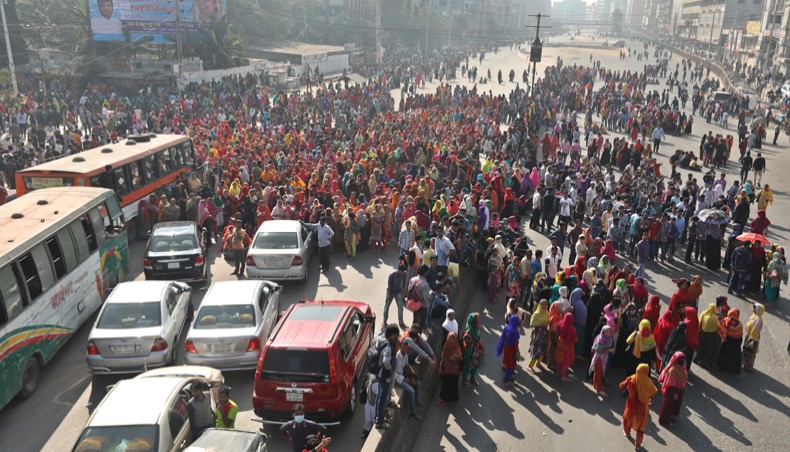EU asks government to respect rights for GSP Plus
The European Union has asked the Bangladesh authorities to demonstrate substantive improvement in the country’s political, civil, human and labour rights situation to get continued preferential treatment in the EU markets after 2020.
The EU also stressed that Dhaka should prepare and follow a roadmap with specific timeline to improve the governance and rights situation in Bangladesh to attain eligibility to be under the next EU regime supporting the Least Developed Countries as the current seven-year support regime would end next year.
‘It is possible for Bangladesh to avail the GSP Plus facility subject to fulfilment of some conditions,’ EU External Action Service (EEAS) deputy managing director Paola Pampaloni said in Dhaka on Monday.
In a meeting with the EEAS, considered as the EU foreign ministry, the Bangladesh side declined to make any commitment on setting and pursuing a timeline, but agreed to take measures for improving the governance and rights situation, said several government officials who attended the EU-Bangladesh joint commission meeting co-chaired by Pampaloni.
About the meeting outcome, foreign secretary M Shahidul Haque on Tuesday said that the government took measures to extensively engage with the EU and its member countries to address the concerns they had raised.
Prime minister Sheikh Hasina has already issued instructions in these regards, he mentioned.
The EU said that ‘the EBA preferences as well as any future trade relationship are conditional’ on the state of human rights in a country, including labour rights, as reflected in the international conventions listed in the GSP Regulation.
The EU, under its Generalised Scheme of Preferences, offers a preferential trade scheme styled as Everything But Arms, or the EBA, on exporting to the EU area subject to fulfilment of the above-mentioned conditions.
The EU raised concerns on the situation of human rights, extrajudicial killings and enforced disappearances, according to a joint press release.
The EU recalled its concerns regarding certain provisions of the country’s Digital Security Act (DSA) and urged its authorities to ensure freedom of expression for the people.
The EU emphasised that a fully empowered and resilient civil society, in all its diversity, is a crucial component of a democracy.
The joint commission discussed the role of democracy, the rule of law and good governance, including the importance of holding free and fair elections.
Both sides stressed the importance of ensuring full implementation of the International Covenant on Civil and Political Rights as well as the other UN human rights conventions ratified by Bangladesh, in line with the Constitution of Bangladesh.
It would be essential to ensure a predictable and transparent business environment for economic operators by strengthening economic relations through increased trade and investment under the EU’s preferential trade scheme – Everything But Arms under the Generalised
Scheme of Preferences – on exporting to the EU area, the EU said.
Exports from Bangladesh to the EU have more than tripled between 2006 and 2018 and the EU is currently the main trading partner of Bangladesh, absorbing half of its overall exports.
According to the EU, Bangladesh is the source of more than 62 per cent of all EBA exports to the EU, and hence the largest beneficiary of the EU EBA programme.
The EU also said that sustained reforms of labour rights standards by the Bangladesh government in full alignment with the conventions of the International Labour Organisation based on the consensus of the tripartite constituents ‘is crucial in this regard’.
The Bangladesh side committed that no provision of the DSA would be used in any way that would limit freedom of expression.
The Bangladesh side also reiterated its ‘zero tolerance’ policy in case of violations of laws and human rights by the law-enforcing agencies, adding that it continued efforts to ensure their accountability.
The value of Bangladesh’s exports to the EU member countries in 2018-19 stood at about 18 billion Euro, which was about 4.5 billion Euro in 2006-07.
The currant development cooperation of the EU and its member states with Bangladesh amounts to more than 541 million euros per year.
The EU appreciated the progress made on the implementation of the joint commitments with respect to the EU-Bangladesh standard operating procedures for the identification and return of persons without authorization staying in EU member countries.
It was the ninth meeting of the joint commission with senior secretary of the Financial Institutions Division M Ashadul Islam as the co-chair from the Bangladesh side.
News Courtesy: www.newagebd.net











